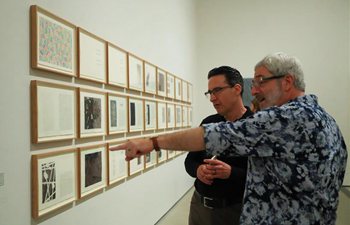WASHINGTON, Feb. 8 (Xinhua) -- U.S. scientists have identified the first bit of evidence of a molecular mechanism by which long-term memories are encoded in a region of the brain.
In a study published Thursday in the latest edition of the journal Neuron, neuroscientists from the Massachusetts Institute of Technology (MIT) uncovered a cellular pathway that allows specific synapses to become stronger during memory formation.
Researchers found that a protein called Npas4, previously identified as a master controller of gene expression triggered by neuronal activity, controls the strength of connections between neurons in the two parts of CA3 and the dentate gyrus in hippocampus. Without the protein, long-term memories cannot form.
"Our study identifies an experience-dependent synaptic mechanism for memory encoding in CA3, and provides the first evidence for a molecular pathway that selectively controls it," says Yingxi Lin, an associate professor of brain and cognitive sciences and a member of MIT's McGovern Institute for Brain Research.
Neurons in the CA3 region play a critical role in the formation of contextual memories, which are memories that link an event with the location where it took place, or with other contextual information such as timing or emotions.
In Lin's previous study, mice received a mild electric shock when they explored a specific chamber. Within minutes, the mice learn to fear the chamber and freeze the next time they enter it.
But when the researchers knocked out the Npas4 gene just in the CA3 region of the hippocampus, they found that the mice could not remember the fearful event. Knocking it out in other parts of the hippocampus, however, had no effect on memory.
In the new study, using the same fear conditioning process, the researchers showed that during learning, certain synaptic inputs to CA3 neurons are strengthened, but not others.
The inputs that are selectively strengthened come from another part of the hippocampus called the dentate gyrus. These signals convey information about the location where the fearful experience took place.
Without Npas4, synapses coming from the dentate gyrus to CA3 failed to strengthen, and the mice could not form memories of the event, it showed.
In future work, Lin hopes to study how the circuit connecting the dentate gyrus to CA3 interacts with other pathways required for memory retrieval.
"Somehow there's some crosstalk between different pathways so that once the information is stored, it can be retrieved by the other inputs," she said.













